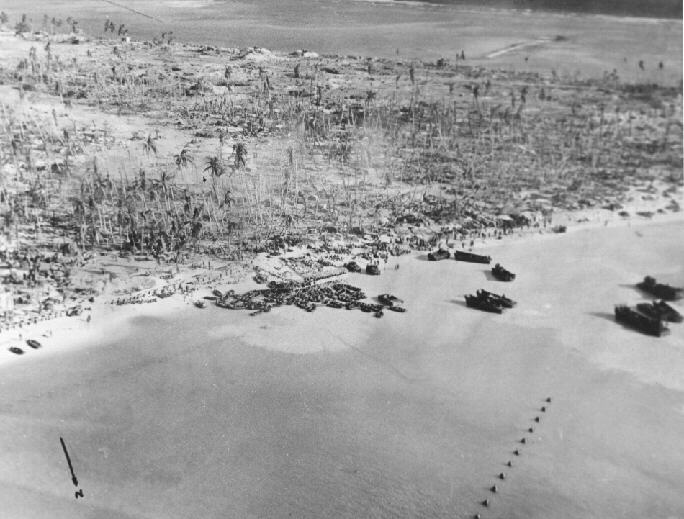"They shipped me to New Zealand. It's across the equator, opposite of our climate here. I left here, and it was the summer. When I got to New Zealand, it was winter. Mud on top of mud. We were camped out about 15 miles from town in a field. Boy they had a lot of sheep out there. We ate a lot of that too. We stayed there a good while. Four or five of us bought an old Model T Ford so we could get around when we weren't training. We trained to take a beach. I was in the 2nd Marine Division.
We took a transport from New Zealand and headed to Tarawa. We knew we were going into battle, but we weren't too sure where we were going. We anchored off a few miles from that beach, and then we started unloaded down this cargo net, down into those little Higgins boats. (November 20, 1943) On the approach to the beach at Tarawa, I was on one side of the Higgins boat and my Lt. was on the other side. He was smoking cigarettes left and right. I was smoking too. He looked over at me and he said, "Man, you really enjoying those Camel's, huh." I said, "Yes sir, I'm kind of nervous." He said, "Don't worry, I'm twice as nervous as you are." He said, "You are just an enlisted man, and you have to do what I tell you. Me, on the other hand, I have to do it myself."
On the way to the beach, our landing craft got caught on a reef and so we had to get out in the water and wade through it to get to the beach. When we hit that coral, the boat stopped, and the gate dropped and they told us to move out. We were a good ways from that beach, probably a couple of hundred yards. And the water was pretty deep. We carried our rifles on top of our heads so they wouldn't get wet. Everything was messed up. We came in at the wrong time. The tides were all wrong.
The navy ships and the planes bombarded the island first to soften the landing. The Japs held off their fire right until we got close to the beach. I remember seeing these rafts of dead bodies floating in the water.
I landed on one end of the island, at Betio. I dug me a foxhole right when I got there at the end of the airstrip, and I got in it. I sleep there in that hole that night. The island was one big airstrip. The Japs were in these concrete bunkers and pillboxes. We had to crawl on the ground to get to these bunkers, and then throw hand grenades in the little hole to take them out. A lot of men were lost that way.
Not long after we landed, we were able to secure the landing strip. I came in from the right corner. Me and this boy from Texas were ordered to deliver a message to the back. When we started going, I was up and running and a Japanese machine gun went off and it caught me right in the leg and I went down. That boy came over to help me, but I told him to keep going, because there was nothing he could do. I was hit in the leg and I couldn't walk. I told him to keep going to deliver that message. So I lay there for awhile. This Marine Corpsman came by and he saw that I was alive, so he kneeled down beside me. I told him that he better lay down on top of me otherwise the Japs were going to kill him. And just when I said that, a bullet passed right through his shirt. You could see the hole in his shirt where that bullet went through. He was lucky.
This other marine came with a jeep and they helped me up and put me on the hood. That night the marines took care of the rest of those Japs right there. They brought me to the beach and I spent the night with these natives in their straw hut. They couldn't speak English. I was coming in and out of consciousness, but they stayed with me all night long. The bullet had crushed all the bone in my leg, and I could see through the hole.
It's amazing the things that happened during the war. Its amazing how they planned for all this stuff. And we were trained so well for being so young. I was only 19 years old."
Born: February 4, 1924
Loreauville, La
2nd Marines-Tarawa
Interview conducted on 3-9-02 by Jason P. Theriot.

Email - Jon@tarawaontheweb.org
copyright 2003 Wheaton, Illinois
Created 28 August 2003

Return to Index